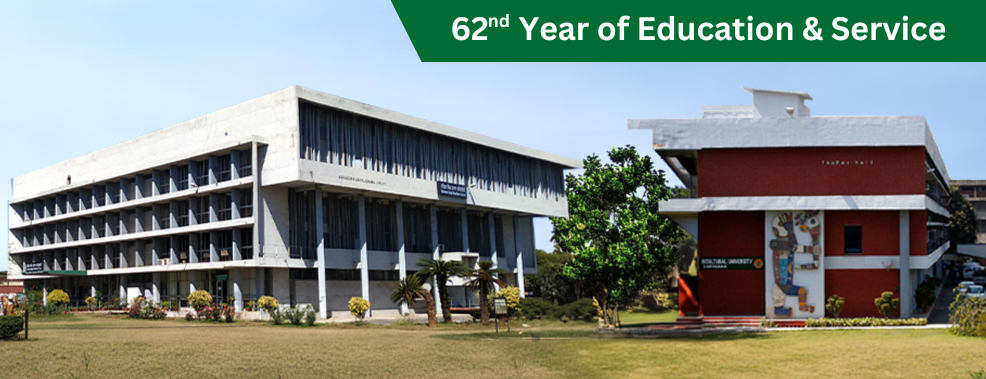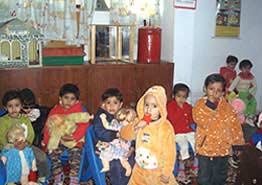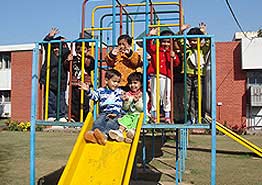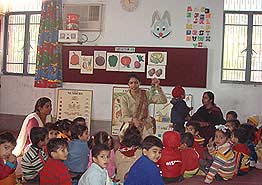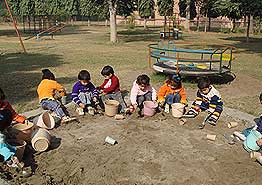62nd Year of Education & Service
College of Community Science / Human Development and Family Studies / Faculty
Name : |
Dr Prachi Bisht |
Designation : |
Scientist |
Office Phone : |
01612401960-357 |
Mobile : |
8003774644 |
Email (Office) : |
bishtprachi@pau.edu |
Research Areas : |
-- |
Researcher ID's : |
-- |
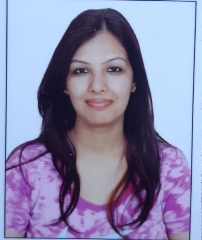
College of Community Science / Human Development and Family Studies / Home
Department of Human development and Family studies (established as Child Development) came into existence in 1975 with the introduction of postgraduate programme in child development. All India Co-ordinated Research Project in Home Science (Child Development) further strengthened this department in 1980. This project is still going on after 42 years of successful completion of four phases of all India programme. At present faculty strength is 8, with 4 Professors, 1 Associate Professor, 1 Assistant Professor and 2 Scientists. Ph.D programme in Human Development was initiated in 1998.
Till date 191 students have obtained Master's degree and 46 students have obtained Ph.D degree from this department. In 2003, the department introduced one year Diploma in Management of Creche and Nursery School. In Januaury 2017, a three-month certificate course in Child and Geriatric Care has also been introduced.
Besides teaching B.Sc.(Hons.), M.Sc and Ph.D programmes, the faculty is actively involved in research and extension activities in Human Development. Several research projects have been completed in the last 42 years. A total number of 11 books, 20 teaching manuals, 20 technical bulletins and 8 research bulletins have been published by the faculty members. More than 500 research papers have been published by the teachers in the national and international journals. All the teachers, research fellows and P.G. students very actively participate in the activities of professional societies and associations.
This department is offering a course on 'Human values ' for all the UG students of the different colleges of the University.
A very popular Laboratory Nursery School is functioning in the Department since 1971-72. A Laboratory Day Care Centre started functioning in the department since July,1998 and the After School Care Programme was initiated in the year 2008-09. These three laboratories have strengthened the hands on training of the students and research in Early Childhood Care, Education and Development, besides providing care to children and fostering their overall development. These facilities are a big help to the working mothers.
Following are the thrust areas of the Departmental research and extension activities:
- Early Childhood Care, Education and Development
- Adolescent growth and development
- Marriage and family Studies,
- Child, adolescent and family Counseling and Therapy
- Management of Senescence
- Developmental, Educational and Social Psychology
- Child and Family welfare
- Women studies and Empowerment
- Children and Families with Special Needs
- Development of Intervention Programmes with special reference to Parents, on rural population and Disadvantaged Section of the society.
- Psycho social issues during life span
College of Community Science / Human Development and Family Studies / Head of Department
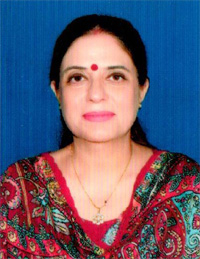
Name : Dr. (Mrs.) Seema Sharma
Address : Human Development and Family Studies
Office : 0161-2401961 ext.357 (O), Ext-322
Phone : 94174-79003 (M)
E-Mail : hodhd@pau.edu
Brief Introduction
Dr Seema Sharma, Professor has joined as Head, Department of Human Development & Family Studies, Punjab Agricultural University, Ludhiana on November 7, 2023. She is an accomplished academician & researcher with over 30 years of experience in teaching, research &extension. She joined as an Assistant Professor in College of Home Science, Koani in July, 1993 and shifted to Department of Human Development, Punjab Agricultural University Ludhiana in November, 1999 and later promoted as Professor in November, 2010.
Dr. Sharma has taught 36 UG & PG courses and was actively involved in the development and updation of various UG, PG, Diploma & Certificate courses. She has also acted as paper setter and evaluator for 14 different universities. She has mentored 11 M.Sc. & 6 Ph.D students and has published 13 book chapters and 2 UG practical manuals.
Dr. Sharma has made significant contribution to the research in the areas of mental health, media usage, socio-emotional well-being and life skills. She has published 95 research papers in national and international journals of repute. She has attended 56 conferences and workshops, published 13 abstracts and presented 15 papers in national and international conferences. She has acted as reviewer for various peer reviewed research journals and associated with many professional societies.
Dr. Sharma has also been actively involved in field outreach activities as she has organized 24 trainings, published 40 extension articles, 5 Radio/ TV talks, 2 extension bulletins and 21 lectures as a resource person to disseminate knowledge to anganwadi workers, school teachers, early childhood education trainers, rural ladies and adolescents. She has worked as convener of various committees at university, college and departmental level.
Her administrative experience include Incharge, Laboratory Nursery School and After School Care Progamme, Nominee, Dean PGS for post graduate students of three departments namely Apparels and Textile Sciences, Resource Management and Consumer Science and Human Development & Family Studies. She has also acted as President, Lawn tennis and Convener, teaching, research and extension for time to time during the PAU service.
She is recipient of Dr. Pramila Pathak Memorial Award of Best Developmental Psychologist during 2012, conferred by Indian Psychometric and Educational Research Association, Patna.
College of Community Science / Human Development and Family Studies / Thrust Areas
Early Childhood Care, Development & Education:
- Development and sustainability of family support system for child care, development & education.
- Vulnerability and resilience among children and families at risk
- Standardization of instructional technology for preschool children
- Home based intervention for comprehensive child care, development & education
- Identification and management of children with learning difficulties
- Child abuse and its effect on developing child
Family Studies:
- Understanding dynamics of family relationships
- Family care and child development issues facing working women
- Elderly care issues in families
- Management of developmentally challenged children by families
- Intervention strategies for empowerment of girl child
College of Community Science / Human Development and Family Studies / Faculty
Faculty
| S.No | Name & Designation | E-Mail/Telephone |
| 1. | Dr Asha Chawla Principal Scientist |
chawlaldh@pau.edu 9417787008 |
| 2. | Dr Deepika Vig Professor |
vigdeepika@pau.edu 9878614775 |
| 3. | Dr Prachi Bisht Scientist |
bishtprachi@pau.edu 8003774644 |
| 4. | Dr Rashmi Upreti Extension Scientist |
rashmiupreti@pau.edu 8218078787 |
| 5. | Dr Ritu Mahal Assistant Professor |
ritumahal@pau.edu 7508078704 |
| 6. | Dr Seema Sharma Professor and Head |
seema_30sept@pau.edu 9417479003 |
| 7. | Dr Tejpreet Kaur Kang Professor |
tejpreet@pau.edu 98552-03033 |
| 8. | Dr Vandana Kanwar Associate Professor (University Counselling and Placement Guidance Cell, PAU) |
kanwarvandana@pau.edu 9872981855 |
College of Community Science / Human Development and Family Studies / Faculty Distinctions
| Sr. No. | Name of Award | Year | Name of Scientist |
| 1 | Prof. S.D Kapoor Memorial Best Researcher Award | 2011 | Dr. Tejpreet Kaur Kang |
| 2 | 12th Mrs. Varalakshmi and Prof. M. Rajamanickam Veteran Eminent Psychologist Award | 2012 | Dr. Tejpreet Kaur Kang |
| 3 | Prof. Promilla Phatak Memorial Best Developmental Psychologist Award | 2012 | Dr. Seema Sharma |
| 4 | Professional Commitment Award | 2014 | Dr. Tejpreet Kaur Kang |
| 5 | Recognized as National Resource Person under Adolescent Education Programme by Ministry of Human Resource Development and United Nations Population Fund, New Delhi | 2014 | Dr. Jatinder Kaur Gulati & Dr. Rippen G Jassal |
| 6 | Excellence in Education Award for ‘Research Work in the field of Education’ | 2019 | Dr. Deepika Vig |
| 7 | Young Researcher Award | 2023 | Dr. Rashmi Upreti |
College of Community Science / Human Development and Family Studies / Important achievments
RECOMMENDATIONS EMERGED:
- Parent education programmes should be conducted to sensitize them about the importance of good home environment in alleviating the education related problems of their children.
- Corporal punishment triggers development of negative personality traits such as anxiety. Therefore, there is need to educate teachers regarding appropriate disciplinary techniques so that adolescents are groomed to become self- confident, self-reliant and responsible citizen of the nation.
- School authorities should put teaching of emotional intelligence in their curriculum and teachers should exhibit pro social and emotionally intelligent behaviour to the students.
- Accreditation criteria need to be developed which covers all quality indicators. There should be registration and accreditation of nursery schools.
- Regular checks by the department of education and other agencies working for welfare of children can also help in assuring highly educated and well trained teachers in nursery schools.
- The government should take steps to provide a well balanced curriculum in urban nursery schools as well as rural anganwadis so that the later academic achievements of these children do not suffer.
- An effort should be made to enroll all the children in pre-school before attending the formal school to reduce the school dropout rate and better adjustment of child and favourable attitude towards school.
- It would be most rewarding for the community and society at large if schools get involve in teaching values to children in school starting as early as possible.
- ‘Teaching values’ could be made part of the school curriculum. The ‘teaching values’ programme need to be repeated at all age levels so as to effect permanent imprinting of values on the minds of students.
- Parents should be oriented about ‘teaching values’ programme at the school before commencement of programme so that the learning of values could be reinforced by them at home.
- Short-term guidance and counselling programmes for the elderly and their care-givers may be organized to educate them about the strategies for better physical, financial and socio-emotional adjustment so as to minimize the vulnerability of the dimensions of Quality of Life.
- Youth must be encouraged to plan out progarmmes to take care of the aged and focus on the “Becoming” dimensions of QOL of the aged.
- Peer Support among youth need to be encouraged in educational institutes to address the psycho social problems of the youth.
- Creation of Day-Care Centres where the aged can usefully spend their day-time and return home in the evening is expected to improve all aspects of QOL of the elderly. These day -care centres would promote non-institutional care for the old without incurring huge expenditure in running such centers for the aged. The major benefit of this venture might be that it would prevent the old from being thrown literally on the roads by their families/adverse circumstances. By engaging them in a few hours of useful activity and companionship outside their homes, the old can be spared the boredom and will be in a better frame of mind to adapt to the new ways of the young ones at home. Members of the family will also be relieved of considerable pressure to devise the means and ways of keeping the aged occupied fruitfully. Talks and discussions on yoga, spirituality, morality and host of other contemporary problems can also be arranged for them. There is need to establish day care centres providing facilities of library, canteen, first-aid in-door and out-door games, prayer, group discussions and of other activities required by the participants. Senior citizens must be given their due, that is, dignity and honour as an expression of gratitude for their being the makers and shapers of the present generation.
- There is an urgent need to chalk out a comprehensive programme for the welfare of the aged which should provide social security and financial assistance in the form of monthly pension, free medical aid, homes for the homeless, concession on consumer goods including spectacles, hearing aids, dentures and travel by rail, road or air.
- Work provision must be there for senior citizens. They must get opportunity to work in any of the fields of their interest-paid, half- paid or honorary. The government and voluntary agencies can utilize their services in vocations suited to them and in development activities in the fields of their specialization. Participation of the senior citizens shall augment the national resources without much expenditure.
- To extend the maximum benefit to the maximum number of senior citizens, there is need for better coordination in the work of the Government and of voluntary organizations. To intensify and expand he welfare projects for the aged help and cooperation of the International organization and agencies can also be sought.
- The major attention regarding the welfare of aged persons is presently focused on the elderly residing in urban areas. However, considering the bulk of aged residing in rural areas, it would be equally important to initiate such scientific investigations regarding the QOL, its attendant problems and the factors impinging on it, even in rural setup before these start assuming serious proportions.
- Parents and teachers play an indispensable role in the language development of the children. So efforts must be put on their part to stimulate and promote the development of language skills among preschoolers.
College of Community Science / Human Development and Family Studies / Current Projects
| ICAR: | |
| a. All India Coordinated Research Project (AICRP) | |
| Sr. No. | Teachers Associated |
| 1. | Dr. Prachi Bisht |
| b. State sponsored Projects: | |
| Nil | |
College of Community Science / Human Development and Family Studies / Important Publications
- Dhami M and Sharma S (2020)Assessment and comparison of psychological counseling needs of rural and urban adolescents.Pharma Innovation J 9: 68-72 (NAAS RATING-5.03)
- Kaushik P, Chawla A and Vig D (2020)Relationship of altruism and empathy among rural and urban adolescents of Ludhiana district.Journal of Positive Psychology 11:46-51 (NAAS RATING 4.64)
- Dhawan V,Kang TK and Sharma S (2020) Internet addiction among adolescents: A study of gender differences.Multi logic in Science 10: 1457-1463 (NAAS RATING 5.20)
- Singh S, Vig D and Chawla A (2020)Locale differentials in academic readiness of private school children.Journal of Positive Psychology 11: 365-370 (NAAS RATING 4.64)
- Ansari S, Kang TK (2020)Family members’ attitude towards stress management of aged elderly.International Journal of Education and Management Studies 10: 444-446 (NAAS RATING 4.79)
- Panwar P, Sharma S and Kang TK (2020) An exploratory study on relationship of socio- emotional learning with aggression among adolescents. International Journal of Current Microbiology and Applied Sciences 9:1-11 (NASS RATING 5.38)
- Kalia P and Saini S (2020) Studying the relationship between emotional intelligence and its components with metacognitive skillfulness in college students. International Journal of Current Microbiology and Applied Sciences 9: 1989-97 (NAAS RATING: 5.38)
- Kalia P and Saini S (2020) Enhancing metacognitive skillfulness of adolescents.Asian Journal of Home Science 15: 38-43 (NAAS RATING 4.44)
- Kalia P, Saini S and Vig D (2021) An appraisal of burden of stress among family caregivers of dependent elderly.Indian Journal of Health and Wellbeing 12: 111-15 (NAAS RATING 4.17)
- Kalia P, Saini S and Vig D (2021)Quality of life of primary caregivers of dependent elderly. Journal of Positive Psychology 12: 07-13 (NAAS RATING 4.64)
- Kalia P and Saini S (2021)The unrecognized burden of stress on family caregivers of dependent elderly.The Pharma Innovation J 10: 444-47 (NAAS RATING 5.23)
- Bisht P, Kaur P and Upreti R (2021) A differential analysis of mental health of farm women with young children and teenage children during COVID-19 pandemic. Indian J of Health & Wellbeing 12:555-58. (NAAS Rating-4.13)
- Navya G and Sharma S (2022) Impact of spiritual intelligence on perceived stress among male and female university students. International J of Bio-resource and Stress Mgt 13: 62-68. (NAAS Rating-5.4)
- Dixit A and Vig D (2022) Assessment of academic anxiety among high and low achievers of senior secondary classes in private schools of ludhiana city. International J of Edu & Mgt 12: 58-62.(NAAS Rating-4.7)
- Dogra D and Kang TK (2022) Psyhcological capital among adolescents: A study of gender Ddfferences.Indian J of Positive Psychology, 13(2): 87-93. (NAAS Rating: 4.38)
- Upreti R and Chawla A (2023) Social Development: An important aspect for adolescence. Indian J of Positive Psychology, 14(2): 249-51 (NAAS Rating: 4.38)
- Bisht P, Upreti R and Rani R (2023) Mindfulness and Mindfulness –based Interventions: A Review Study. Indian J of Positive Psychology, 14(2): 256-58 (NAAS Rating: 4.38)
- Upreti R and Bisht P (2023) Empowering Women: The transformative role of mindfulness in enhancing well-being. Indian J of Health and Wellbeing, 14(2): 278-80 (NAAS Rating: 4.11)
- Arya M and Vig D (2023) Impact of Anganwadi Workers’ Soft Skills on Anganwadi Children’s Developmental Milestones. Indian Journal of Extension Education. 59(3):118-121. (NAAS Rating: 5.95)
- Arya M, Vig D and Chawla A (2023) Job Satisfaction of Anganwadi Workers: Comparative Study and Impact on Developmental Milestones of Children in Rural and Urban Anganwadis of Ludhiana District. Journal of Community Mobilization and Sustainable Development.18(1): 56-62. (NAAS Rating: 5.30 )
- Toor A and Kang TK (2023) A study of dispositional resilience among college students during COVID-19 pandemic. Indian J of Positive Psychology, 14(2): 76-84. (NAAS Rating: 4.38)
College of Community Science / Human Development and Family Studies / Academic Programs
| M.Sc Human Development and Family Studies | |
| Sr. No. | Course Title |
| *HDFS-501 | Theories of Human Development |
| *HDFS-502 | Dynamics of Human Development |
| *HDFS-503 | Methods and Techniques of Assessment in Human Development |
| *HDFS-504 | Innovative Programmes in Early Childhood Development and Education |
| HDFS-505 | Gender Issues in Human Development and Relationships |
| HDFS-506 | Adolescent Development |
| HDFS-507 | Management of Differently Abled |
| HDFS-508 | Adolescent Development and Challenges |
| HDFS-509 | Guidance and Counselling |
| HDFS-510 | Interventions for Differently Abled Children |
| HDFS-511 | Family Ecology |
| HDFS-512 | Family and Cultural Diversities |
| HDFS-513 | Family Therapy |
| HDFS-591 | Seminar |
| HDFS-599 | Thesis/Research |
| Ph.D Human Development and Family Studies | |
| *HDFS-601 | Advanced Human Development |
| *HDFS-602 | Ecology and Human Development |
| *HDFS-603 | Programme Development for Vulnerable Families |
| HDFS-604 | Strategic Developmental Intervention |
| HDFS-605 | Family Studies |
| HDFS-606 | Adulthood and Aging |
| HDFS-607 | Mental Health |
| HDFS-608 | Qualitative Research Methods |
| HDFS-691 | Seminar I |
| HDFS-692 | Seminar II |
| HDFS-699 | Doctoral Research |
| *core courses | |
College of Community Science / Human Development and Family Studies / Facilities & Services
| Facility | Admission Capacity & Age | Objectives | |||||
| Laboratory Nursery School | 30 children of 2 years and above |
|
|||||
| Laboratory Day Care Centre | 30 Children of 2 years & above |
|
|||||
| Seminar Room | • Equipped with latest facilities for presentations. | ||||||
| After School Care Programme: | 30 children from 2.5 to 8 years. |
|
|||||
| Psychological Testing Laboratory | All age Groups |
|
|||||
| Guidance & Counseling Cell | All Age Groups |
|
|||||
|
|||||||
College of Community Science / Human Development and Family Studies / PG Students
| Name of the Student | Admission No. | Name of the Advisor | Topic | |
| M.Sc | ||||
| 1. | Mehakdeep Kaur | L-2022-CS-232-M | Dr. Deepika Vig | Relationship of Gender Role Attitude with Selected Socio-personal Variables Among Urban Adolescents |
| 2. | Arshdeep Kaur | L-2022-CS-228-M | Dr. Tejpreet K Kang | Psychological Hardiness as a Predictor of Optimum Health and Happiness among Adolescents |
| 3. | Manisha Rani | L-2022-CS-231-M | Dr. Seema Sharma | Socio-emotional School Climate as a Correlate of Academic Achievement and Academic Resilience among Senior Secondary School Students |
| 4. | Romanpreet Kaur | L-2022-CS-234-M | Dr. Prachi Bisht | Childhood Trauma as a Correlate of Attachment Styles among Undergraduate Students |
| 5. | Suprit Kaur | L-2022-CS-235-M | Dr. Rashmi Upreti | Emotional Self-Disclosure and Psychological Well-being among Undergraduate Students |
| 6. | Damandeep Kaur | L-2022-CS-229-M | Dr. Asha Chawla | Relationship of Gender Role Attitude with Selected Socio-personal Variables among Rural Adolescents |
| 7. | Kago Kaniya | L-2022-CS-317-M | Dr. Vandana Kanwar | Study on Mental Well Being, Psychological Counselling Needs and Educational Adjustment of University Students |
| 8. | Trishya Yumnam | L-2022-CS-318-M | Dr. Ritu Mahal | Influence of Spiritual Intelligence on Perceived Family Climate and Well-Being of adolescents |
| 9. | Amrita Kaur | L-2023-CS-212-M | Dr. Seema Sharma | Yet to be decided |
| 10. | Annie | L-2023-CS-213-M | Dr. Prachi Bisht | Yet to be decided |
| 11. | Gurleen Kaur Bajwa | L-2023-CS-214-M | Dr. Asha Chawla | Yet to be decided |
| 12. | Jagjit Kaur | L-2023-CS-215-M | Dr. Tejpreet K Kang | Yet to be decided |
| 13. | Kunika | L-2023-CS-216-M | Dr. Ritu Mahal | Yet to be decided |
| 14. | Radhika Mittal | L-2023-CS-217-M | Dr. Deepika Vig | Yet to be decided |
| 15. | Sonali | L-2023-CS-218-M | Dr. Vandana Kanwar | Yet to be decided |
| Name of the Student | Admission No. | Name of the Advisor | Topic | |
| Ph.D | ||||
| 1. | Irin Das | L-2020-CS-170- D | Dr. Asha Chawla | Impact of Screen Viewing on Selected Variables of Psychological Well-being Among Adolescents |
| 2. | Nishita Singh | L-2021-CS-158-D | Dr. Deepika Vig | Comparative Analysis of Career Decision Making Among Urban Low and High Achievers of Three States |
| 3. | Poonam | L-2021-CS-160-D | Dr. Asha Chawla | Comparative Analysis of Career Decision Making Among Rural Low and High Achievers of Three State |
| 4. | Ulka Pant | L-2023-CS-160-D | Dr. Seema Sharma | Yet to be decided |
| 5. | Sangeeta | L-2023-CS-158-D | Dr. Deepika Vig | Yet to be decided |
| 6. | Ayam Monika Devi | L-2023-CS-157-D | Dr. Asha Chawla | Yet to be decided |
| 7. | Anupriya | L-2023-CS-159-D | Dr.Seema Sharma | Yet to be decided |






